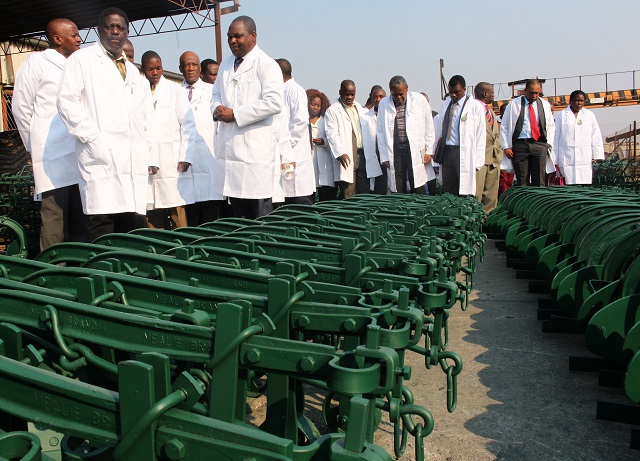Import restrictions meant to revive industry

Yoliswa Dube
STATUTORY Instrument 64 of 2016 which many have interpreted as advocating for the “ban” of import goods has met with mixed reactions.
The ordinary Zimbabwean felt the government had cut off a lifeline while captains of industry found the move likely to promote their businesses.
The piece of legislation was introduced to stem the flood of cheap imports into the country which were undermining local industry and stifling efforts to create jobs.
It was also introduced because Zimbabwe had become a rich fishing pond for the evasive US$. Also, the Government said it introduced SI64 in response to petitions by local producers, who said they were under siege from uncontrolled imports claiming they could meet local demand.
“If people are no longer able to import certain goods, it means my source of income is also affected. The move by government was abrupt and I’ve not had the opportunity to bridge the gap that it will cost me financially,” said Mr Byron Moyo, a malayitsha.
His extra pickings, which largely come from transporting goods from neighbouring South Africa, have since diminished since the introduction of SI64. “It has become extremely difficult to operate. Everyone is skeptical. A chain of people is affected by all this and to be honest, it’s doing no one any good.
‘‘Government needs to address the needs of the people before introducing some of these policies,” he said. Mr Moyo’s trips to South Africa have become less lucrative, despite having to travel to the neighbouring country every other day to make that much needed cash.
After all, he has a family to feed and children to educate. Industry is happy to enjoy the benefits of import restrictions but is resisting methods proposed to incentivise exports.
The Confederation of Zimbabwe Industries has come out in full support of SI64, arguing that imports had not only led to deindustrialisation but had also drained the economy of $36 billion in six years since dollarisation, given the country’s estimated annual import bill of $6 billion.
Industry has also complained about the high cost of local production.
“Manufacturing sector’s capacity utilisation, which stands at 34 percent (as at 2015) clearly shows that the country has idle capacity of over 60 percent, which can be used for import substitution,” argues the CZI in support of the SI.
The government has been clear that import restrictions are not forever, mindful of its obligations to regional trade protocols and the broader desire to remove trade barriers on the continent.
Vice President Emmerson Mnangagwa recently said while the piece of legislation was meant to protect local companies from unfair competition, enhancing competitiveness remained a long-term solution.
He underscored the need to develop a robust import substitution strategy meant to replace imported products with local goods while urging consumers, including the government, to embrace local commodities.
“We need to appreciate that restrictions are not permanent and that in the long term, pressure from trading partners will always force us to open our markets again.
‘‘Industry must appreciate the important role that competition plays in the global economy. We risk closing ourselves out of the global market and fail to develop in line with global trends,” said VP Mnangagwa.
He said for the country to be competitive again, a model that looks at major costs and prices to come up with a range within which costs and prices may fall, as guided by agreed regional benchmarks, should be developed.
“I urge you to always remember that as we purchase foreign products, we actually make foreign-based companies to attain critical volumes that allow them to enjoy economies of scale and hence cut prices on us,” said VP Mnangagwa.
Economic analyst Dr Davison Gomo said the intentions of the government are very responsible because a country cannot watch while its industry is being suffocated by cheap imports.
“In the last 15 years, the country has experienced serious haemorrhaging. Industry can’t deal with the daily needs of the people but in the long term, how can you get industry to function as well as create employment without introducing these policies. It’s a bold move to correct the situation,” said Dr Gomo.
By having a functioning industry, he said, Zimbabwe can produce goods which can be put on the export market and earn the country some money.
“People are angry because they were not given an opportunity to prepare. Those who buy and sell goods were crippled by the move.
‘‘In the meantime, customers can’t get what they want at the price they want. I understand why the public is reacting, there’re no jobs in the short term,” said Dr Gomo.
“Reviving industry will attract investment into the local market. We’ve got the infrastructure and the expertise. With industrialisation, a lot of the problems we’re facing as a country will be addressed.”
It is critical that people embrace the long term benefits of the introduction of SI64, he said.
“We need to look at the long term interests of the country. In order for manufacturing to take place successfully, we need people that are prepared to do things otherwise the policy will go to waste,” said Dr Gomo.
It is up to government to create the space to promote local investment, he said.
“People needed to be patiently explained to in order for them to understand the long term benefits the policy will bring. The government failed to manage the process which doesn’t offer short term solutions to its people, that’s why they feel robbed by the legislation. They were not given the chance to prepare for it.”
Some of the products which were removed from Open General Import Licence are bottled water, mayonnaise, salad cream, peanut butter, jams, Maheu, canned fruits, vegetables, pizza, yoghurts, flavoured milks, dairy juice blends, ice creams, cultured milk, cheese, coffee creamers, camphor creams, white petroleum jellies, body creams and plastic pipes.
The legislation also controls importation of second hand tyres, urea and ammonium nitrate fertilisers, tile adhesives and tylon, shoe polish and synthetic hair products.
Goods categorised as builder-ware products including wheelbarrows (flat pan and concrete pan), roofing frameworks, pillars, columns, balustrade, shutters, towers, masts, roofs and roofing framework are also part of the restricted list.









Comments